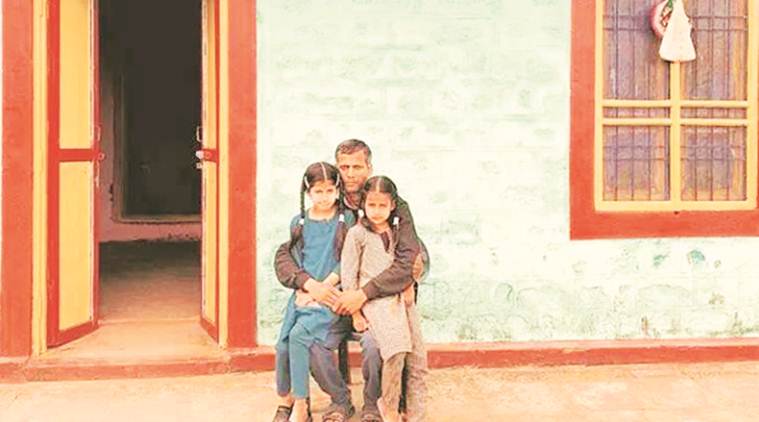 Susheel Kumar, who lost his three-year-old son, with his two daughters, in Jammu. Express file
Susheel Kumar, who lost his three-year-old son, with his two daughters, in Jammu. Express file
Nearly a month after the first cases came to light, the fate of a majority of customers that bought bottles of Coldbest cough syrup from a contaminated batch is still unknown.
Drug regulators have stopped sales of the syrup, after it allegedly led to the deaths of several children in J&K, but are still trying to recover bottles purchased from this batch, The Indian Express has learnt.
“All state drug controllers have been alerted and told to try their best and use all their machinery to retrieve the bottles (of Coldbest) from this batch that have already been sold,” said a senior drug regulatory official, speaking on condition of anonymity.
Experts suggest that such a recall is difficult due to inadequate enforcement of drug laws, which has provisions that allow regulators to track every patient that purchased a prescription drug. The Drugs and Cosmetics Rules specifically mandate that those with licences to sell prescription products, such as Coldbest, have to maintain a prescription register with details like name and address of the patient.
Around 3,400-3,450 of these bottles from a batch of over 5,500 had been sold since September. Himachal Pradesh Drug Controller Navneet Marwah had said earlier. “We are trying our best to track down consumers through sales receipts, but this is an old batch. It’s a 60-ml bottle, so if someone took 5-6 ml in each dose, it would finish in 10-12 doses,” he had said.
Of the 1,315 bottles distributed in J&K alone, 947 were sold. Sale of the remaining 368 bottles was stopped, according to J&K Drug Controller Lotika Khajuria. At least nine children from Udhampur’s Ramnagar, known to have consumed Coldbest from the September batch, died of kidney failure between December-end and January. J&K, Haryana and Himachal have decided to file FIRs against Digital Vision Pharma, the company that makes Coldbest, after samples tested from the September batch revealed the syrup contained nearly 35 per cent of diethylene glycol (DEG) — an antifreeze chemical that can cause kidney failure. “An FIR has been lodged against the manufacturing and analytical chemist also. The matter is under investigation,” Marwah told The Indian Express.
On February 21, The Indian Express reported that, besides Himachal and J&K, the syrup had also been sold to distributors and dealers in Uttarakhand, Haryana, UP, Tamil Nadu, Shillong and Tripura — and that no other case related to its effects had been reported so far, barring the Udhampur deaths.
Section 65 of Part VI of the Drugs and Cosmetics Rules, 1945, states that the supply of any drug sold on the prescription of a registered medical practitioner shall be recorded “at the time of supply” in a prescription register “specially maintained” for the purpose. The particulars that shall be recorded include the date of supply, name and address of the prescriber and the “name and address of the patient”.
“The degree of enforcement of this provision varies from region to region,” said H G Koshia, Commissioner, Food and Drug Control Administration, Gujarat.
“Whether a rule is known or not, especially when you are going and procuring a licence for sale, you have to adhere to these conditions,” said pharmaceutical lawyer Archana Sahadeva.
“But, when you go buy medicines, how many chemists do you know actually ask for a prescription and note down your details?” she said, adding that the onus is also on regulators to ensure they are monitoring the situation.
Coldbest is to be sold on the prescription of a doctor, according to Koshia. “Previously, I would also struggle with recalls, but now we have a database of all retail pharmacies in Gujarat and an SMS recall system that we used to send out alerts to stop any sale of this particular batch of the product in the state. Fortunately, none of the bottles were being sold here,” he said.
Chemists in the state keep a book of prescription medicines sold to patients along with their contact information — a detail that Gujarat drug inspectors check for while inspecting pharmacies there. “Had it been in my state, I could have got details of each and every patient that bought the syrup and alerted them,” Koshia said.
The situation bears similarities with the 1937 elixir sulfanilamide disaster in the US, where over 100 people died after consuming a drug for streptococcal infections mixed with DEG. In that case, over 200 inspectors from the US Food and Drug Administration examined shipping records, order slips and prescriptions to locate every last bottle.
Public health activist Dinesh Thakur says India’s non-binding rules for drug recalls, prepared by the Central Drugs Standard Control Organisation (CDSCO), are “silent” on how communication of a recall is made to patients.
“It (the existing guidelines) is all about recalling the product from the retail level, which is the lowest level in the hierarchy specified. There is no mention of what happens to the product which the consumer has… The rules, as they are framed now, are completely a joke,” he said.
Regulators are, at times, also unable to ensure companies recall batches of substandard drugs out in the market, despite regulations mandating such recalls.
For instance, The Indian Express found that CDSCO had flagged the same batch of a diabetes drug produced by Digital Vision in two separate alerts around three months apart in 2018 and 2019. Queries sent on February 28 to Drug Controller General of India V G Somani about these findings, as well as follow-up emails, did not elicit a response.
Queries sent on March 2 to Digital Vision and Vellinton Healthcare, in which Digital Vision’s managing directors hold directorial positions, about the recall process and previous substandard batch alerts on their drugs remained unanswered.